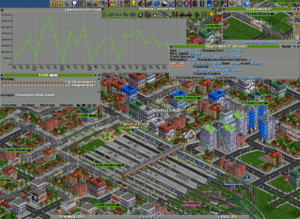
Back لعبة محاكاة التجارة Arabic Videojoc de simulació econòmica Catalan Økonomisk simulationsspil Danish Wirtschaftssimulation (Computerspielgenre) German Ekonomia simulada videoludo Esperanto Videojuego de simulación económica Spanish Resurssienhallintapeli Finnish Jeu vidéo de simulation économique French Permainan simulasi bisnis ID Videogioco gestionale Italian

 |
| Part of a series on |
| Simulation video games |
|---|
Business simulation games,[1][2] also known as tycoon games or economic simulation games,[3][4] are video games that focus on the management of economic processes,[5] usually in the form of a business. Pure business simulations have been described as construction and management simulations without a construction element,[2] and can thus be called simulations.[2] Micromanagement is often emphasized in these kinds of games. They are essentially numeric but try to hold the player's attention by using creative graphics.[2] The interest in these games lies in accurate simulation of real-world events using algorithms,[6] as well as the close tying of players' actions to expected or plausible consequences and outcomes.[6][7] An important facet of economic simulations is the emergence of artificial systems, gameplay and structures.[8]
There are many games in this genre that have been designed around numerous different enterprises and different simulations. Theme Park can be called a business simulation because the goal of the game is to attract customers and make profits; the game also involves a building aspect that makes it a construction and management simulation.[2] This genre also includes many of the "tycoon" games such as Railroad Tycoon and Transport Tycoon. Another similar example of a business simulation (that models a startup business) is "SimVenture Classic".
Trevor Chan is a notable developer of business simulation games,[9] having developed the 1995 game Capitalism, which has been described as the "best business simulation game".[1] A sequel, entitled Capitalism II, was released in 2001. An expanded version of Capitalism II, called Capitalism Lab,[10] was released in 2012 and continues to be updated regularly with new features and improvements.
Active development of Internet technologies and the growth of the Internet audience in recent years gave a powerful impetus to the development of the industry of online games, and in particular, online business simulations.[11] There are many varieties of online business simulations – browser-based and downloadable, single-player and multiplayer, and real-time and turn-based. Some online simulations are aimed primarily at the leisure market while others have real world applications in training, education and modelling.
- ^ a b Review – IGN: Trevor Chan's Capitalism II
- ^ a b c d e Rollings, Andrew; Ernest Adams (2003). Andrew Rollings and Ernest Adams on Game Design. New Riders Publishing. pp. 417–441. ISBN 1-59273-001-9. Archived from the original on 2008-09-15. Retrieved 2008-05-23.
- ^ IGN: Air Bucks,
- ^ News – IGN: Big Biz Tycoon Ships
- ^ Rollings, Andrew; Ernest Adams (2006). Fundamentals of Game Design. Prentice Hall.
- ^ a b Laramee, Francois Dominic (2002). Game Design Perspectives: Advances in Computer Graphics and Game Development. Charles River Media. p. 117. ISBN 1-58450-090-5.
- ^ Slator, Brian M.; Richard T. Beckwith; Harold Chaput (2006). Electric Worlds in the Classroom: Teaching and Learning with Role-Based Computer Classes. Teachers College Press. p. 61. ISBN 0-8077-4675-4.
- ^ Natkin, Stéphane (2006). Video Games and Interactive Media: A Glimpse at New Digital Entertainment. A K Peters, Ltd. p. 97. ISBN 1-56881-297-3.
- ^ IGN: Joan of Arc Interview
- ^ "Capitalism Lab – Taking Business Simulation to a New Frontier".
- ^ Cite error: The named reference
bizsimswas invoked but never defined (see the help page).